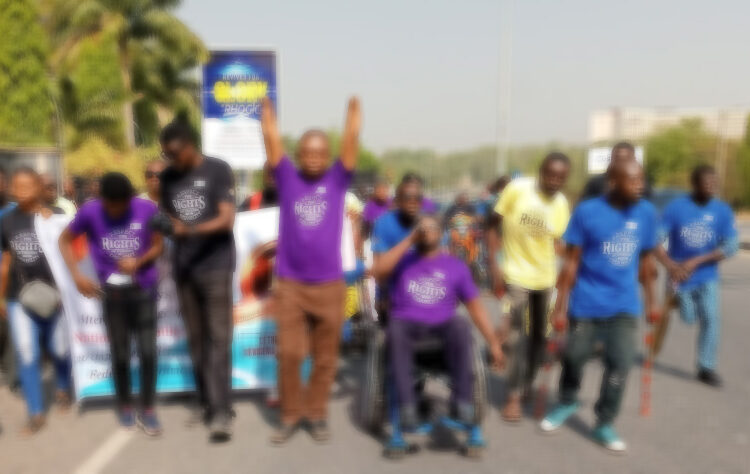In 2018, Nigeria took a historic step toward inclusion and equality by enacting the Discrimination Against Persons with Disabilities (Prohibition) Act. One key provision required public institutions to reserve at least five per cent of their employment opportunities for Persons Living With Disabilities (PLWDs).
Despite this epoch-making legislation, its implementation has been far from satisfactory, leaving millions of Nigerians with disabilities to face persistent unemployment and systemic marginalisation.
We think that it has become pertinent for the federal and state governments to prioritise the enforcement of the five per cent employment quota, assess the challenges PLWDs
encounter, and address the urgency of these issues to foster a more equitable society.
The lawmakers understood that the nation cannot build an inclusive society if we do not provide for its most vulnerable members. Inclusion through employment is a critical pathway to social inclusion, economic independence, and dignity.
For PLWDs, who constitute an estimated 15 per cent of Nigeria’s population (over 25 million people), gaining meaningful employment is not just an opportunity but a necessity. By reserving five per cent of jobs in public institutions for them, the government will create an environment where PLWDs can actively contribute their quota to national development.
It goes without saying that when PLWDs are gainfully employed, they contribute to the economy through tax payments and other production processes, thereby reducing their dependency on already inadequate social support systems.
The World Bank has consistently highlighted the economic potential of inclusive labour policies, indicating that the integration of marginalised groups, including PLWDs, positively impacts Gross Domestic Product (GDP).
By failing to implement this critical employment quota, Nigeria risks losing out on the untapped potential of millions of its citizens.
The Discrimination Against Persons with Disabilities Act is not merely a guideline but a legal mandate. As the law of the land on the subject, it obligates public institutions to comply with its provisions. Beyond legality, enforcing this quota is a moral imperative for a nation that aspires to uphold justice, equity and equality.
It is imperative to note that people living with disabilities have far more challenges than other able-bodied citizens, especially now that the economy of the country is in dire strait.
Despite enacting the 2018 Act, PLWDs in Nigeria face significant challenges that hinder their social and economic participation. These challenges must be addressed to ensure the effectiveness of the employment quota.
Some of the challenges include but are not limited to cultural misconceptions about disabilities, which often lead to stigma and exclusion. Many employers, even in public institutions, erroneously perceive PLWDs as incapable of performing specific tasks. This bias contributes to high unemployment rates among this segment of the population, as opportunities are frequently denied them based on stereotypes rather than merit.
While the 2018 Act outlines provisions for employment quotas, enforcement mechanisms remain weak. Many state governments have yet to domesticate the law; even where it is domesticated, monitoring compliance has been inadequate. The law’s impact remains minimal without a robust framework to track and enforce adherence.
Nigeria’s broader economic challenges, including high unemployment rates and limited job creation efforts, disproportionately affect vulnerable groups like PLWDs. In times of economic downturn, individuals with disabilities are often the first to be excluded from employment opportunities.
The federal government must collaborate with state governments to ensure full domestication of the Disability Act across all states. Additionally, independent monitoring bodies should be established to track compliance with the employment quota and impose penalties on institutions that fail to meet their obligations.
Public institutions must lead by example by investing in accessible infrastructure and technologies. This includes modifying buildings, providing assistive devices, and adopting flexible work arrangements that cater to the unique needs of PLWDs. Collaboration with civil society organisations, including disability advocacy groups can play a pivotal role in bridging the gap between policy and practice.
To encourage adherence to the employment quota, the government can introduce incentives such as tax breaks or grants for public institutions that exceed the five per cent requirement.
Failure to enforce this employment quota has far-reaching consequences for Nigeria. Beyond the moral burden of excluding millions from economic participation, the country risks perpetuating cycles of poverty and dependence among PLWDs.
We boldly say that the potential of this legislation remains unrealised due to weak enforcement and systemic challenges. By reserving at least five per cent of public sector jobs for persons with disabilities and addressing the barriers they face, Nigeria can unlock the potential of millions of its citizens, strengthen its economy, and reaffirm its commitment to justice and equality. The time for action is now—federal and state governments must rise to the occasion and ensure no Nigerian is left behind.











